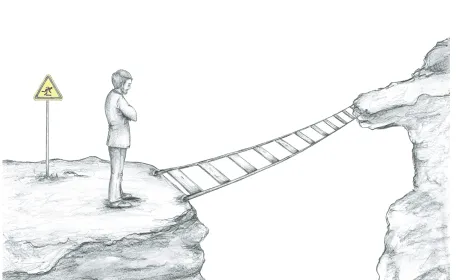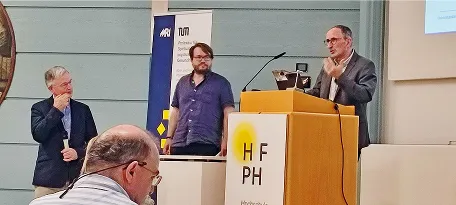Patients as experts: Philosophizing in healthcare
Severe physical or emotional suffering or confrontation with their own death can lead patients to experience their situation as a boundary situation in the sense defined by Karl Jaspers. In a qualitative study, we investigated how patients and caregivers perceive such situations. The study showed that acknowledging the philosophical dimension of boundary situations can be supportive for patients.

Focus Group: Boundary Situations and Spiritual Care
PD Dr. Rico Gutschmidt (University of Konstanz / ETH Zurich), Alumnus Philosopher in Residence (funded by the TÜV SÜD Foundation and as part of the Excellence Strategy of the federal and state governments) | Host: Prof. Eckhard Frick (TUM)
The term “boundary situation” was defined by the German psychiatrist and philosopher Karl Jaspers (1883–1969) and refers to the limits of action and life, such as struggle, guilt, suffering, and death. Human life always moves within these boundaries, but this is experienced especially in particular situations [1]. Such situations include severe physical and emotional suffering and the direct confrontation with one's death, e.g., due to a terminal illness.
In this research project, we investigated how patients experience boundary situations and how caregivers in medicine, psychotherapy, nursing, and social work perceive the boundary situations of their patients. The aim of the study is to gain a better understanding of the experience of boundary situations. How does it feel for people to experience a boundary situation, and how does their own experience of boundary situations or their professional dealing with boundary situations change their view of themselves and the world?
A unique feature of this research project was that patients were interviewed as experts in boundary situations. Philosophers can think a great deal about boundary situations, but patients in boundary situations have immediate access. The philosophical interest of this project was the question of what we can learn about life from patients in boundary situations.
Patients and caregivers were interviewed as part of a qualitative interview study. As this project was mainly concerned with an analysis of lived experience, a hermeneutic-phenomenological method was chosen: interpretative phenomenological analysis [2]. It combines philosophical hermeneutics, i.e., the study of understanding, with the philosophical school of phenomenology, which is concerned with describing experiences.
Implementation

Following preparatory observations and participation in ward rounds, interviews were conducted with eight patients and eight caregivers. Various wards of the Department of Psychosomatic Medicine and Psychotherapy (day-clinic and inpatient treatment, palliative ward) and other areas of the TUM University Hospital rechts der Isar (neuro-oncology, radio-oncology) were involved. The response was excellent, the cooperation with the responsible persons worked very well, and there was a considerable interest in the topic.
The interviews lasted 20 to 30 minutes. All interviews were digitally recorded and transcribed verbatim. The transcripts were analyzed inductively according to the principles of interpretative phenomenological analysis. An overarching understanding of the entire data set was developed from an analysis of the individual interviews in defined individual steps. Finally, the research questions were approached with the help of broader concepts from philosophy and spiritual care.
Methodological challenges
People in boundary situations are particularly vulnerable and often cannot be interviewed directly about their situation. Although qualitative studies have been conducted in the health sector for a long time, there still needs to be an established method for qualitative studies on boundary situations due to this particular difficulty [3]. This project was, therefore, methodologically explorative. For example, it became apparent during implementation that open questions are insufficient in this context, which is why a philosophical conversation was initiated in some cases.
Another challenge was that the experience of a boundary situation is often unspeakable: It frequently leaves you at a loss for words and involves insights that are very difficult to put into words [4]. This unspeakability was frequently present in the conversations as a feeling: It was often impossible to talk directly about the respective boundary situation, especially about death. For this reason, notes were also taken on non-verbal expressions, emotional states, and personal feelings. In addition, it was often necessary to search together for words that could express the experience.
Results
Some significant results were obtained on the experience of boundary situations. Patients often perceive themselves as being outside of normality and feel alienated. Correspondingly, there is a better connection to patients in boundary situations when caregivers have experienced boundary situations themselves. Intuition and sensing also play a crucial role in dealing with patients in boundary situations.
From a philosophical point of view, it is interesting that patients and caregivers have altered perspectives on things that seem to be taken for granted. From the perspective of boundary situations, things we normally rely on are experienced as small miracles. Patients and caregivers also speak of a new attitude toward life, which can be described with serenity, gratitude, and appreciation. And there have been many reports of particular insights. For example, people have always been aware of their own mortality but understand it in a new and more profound way in boundary situations.
Applications, transfer, and further research
The study has shown that acknowledging the philosophical dimension of boundary situations by caregivers can be supportive. Philosophical conversations about the general situation in which they find themselves can be relieving for patients in boundary situations. Some patients have explicitly emphasized the importance of philosophical reflection in dealing with their situation.
The findings are to be made available to those responsible in the healthcare sector, thus contributing to better support for patients in boundary situations. The findings could be used to design training courses to sensitize caregivers to patients in boundary situations. Last but not least, verifying and expanding the results obtained in a quantitative study would be important.
[1]
Jaspers, K. Philosophie. Bd. II, Berlin, Göttingen, Heidelberg: Springer (1932 / 1973).
[2]
Smith, J. A., Flowers, P. & Larkin, M. X. Interpretative Phenomenological Analysis. Theory, Method and Research, London: Sage (2009).
[3]
Cf. Feith, D., Peter, C., Rehbock, T. & Tiesmeyer, K. Grenzsituationen. Qualitative Forschung zu existenziellen Krankheitserfahrungen und Therapieentscheidungen. In: Netzwerk Qualitative Gesundheitsforschung (Hrsg.): Perspektiven qualitativer Gesundheitsforschung, Weinheim: Beltz Juventa Verlag, 216–269 (2020).
[4]
Cf. Gutschmidt, R. Grenze und Transformation. Philosophische Erfahrung als nichtpropositionale Einsicht. Deutsche Zeitschrift für Philosophie 70 (5), 781–794 (2022).
Selected publications
- Frick, E. & Gutschmidt, R. Wir werden mit dem Geheimnis der Existenz nie fertig. Spiritual Care 12 (4), 371–374 (2023).
- Gutschmidt, R. Grenzsituationen im Gesundheitsbereich. Spiritual Care 13 (2), 191–194 (2024).
- Frick, E. & Gutschmidt, R. (Eds.) Existential Elucidation. Jaspers, Boundary Situations, and Spiritual Care. De Gruyter (forthcoming).
